Family and faith: Inside the world of Prime Minister Scott Morrison
As Scott Morrison prepares to go to the polls he gives a candid insight into his home life from pizza on a Friday, watching Marvel movies and church on Sunday. He also opens up on the issue that causes him greatest concern when it comes to his children.
NSW
Don't miss out on the headlines from NSW. Followed categories will be added to My News.
Scott Morrison really is the family guy.
Not just because it’s clear that his wife Jenny and daughters Abbey, 14, and Lily, 12, are the centre of his world. But because he believes that family is vital to helping every kid negotiate the treacherous world they’re growing up in and helping to fix the country’s growing youth mental health crisis.
It’s the issue he says “that most concerns me for my own kids and their friends”.
The Prime Minister, 53, took time out from his frantic election schedule for an interview about how he and Jenny, 54, have tried to keep life as normal as possible for their children inside the goldfish bowl, and how he thinks he will cope when he leaves office.
But throughout the discussion, he returns again to the importance of family, how it made him and why it matters for the Australia he wants to build.
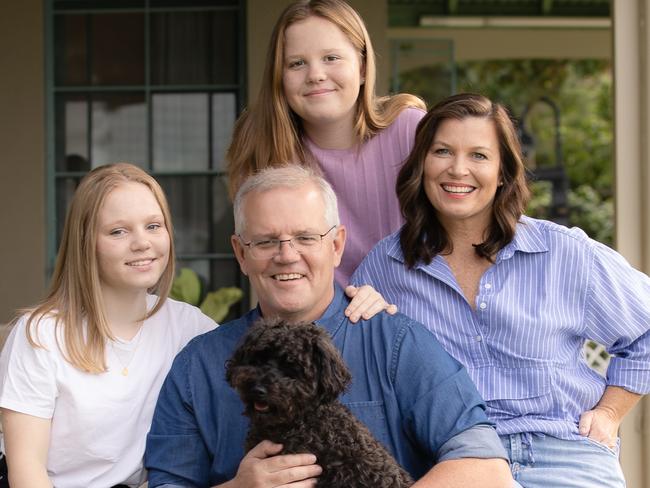
“The anxiety kids face is much greater than when we were kids,” he says, adding that the world they’re growing up in is much more complicated than life seemed back in the 1980s.
WEEKEND PROFILE: Anthony Albanese opens up about his private life
“Peer groups. Friends. Being accepted. The desire for recognition and identity. For affirmation. For that sense of confidence about who you are. All of this stuff is getting just foisted on them all the time. And yeah, I think media has a lot to do with that. And social media has a lot to do with it. This is creating tremendous stresses and anxieties, which plays itself out in what can be very serious mental health issues.”
It’s important, he says, to be involved in your children’s lives – a job, he says, that has inevitably fallen more to his wife.
“Jenny does an amazing job for our girls, just understanding them. Just understanding. And it can be hard to understand because we’re living in a world different from the one we grew up in.
“But equally, you know, I worry about young boys too. Worry is probably not the word – I’m keen for them to grow up in a world where they can be themselves and they can be ambitious for their future and not feel like the cards are going to be stacked against them.”
He credits Patrick McGorry, a board member with youth mental health not-for-profit Headspace, with alerting him to the epidemic of mental illness among young people.
“I remember when I was a kid, no one talked about early youth psychosis, I mean the mental health discussion and anxiety for young people that we grew up with was just not even acknowledged, let alone addressed.
“Now, that doesn’t mean it didn’t exist. Of course it did.”
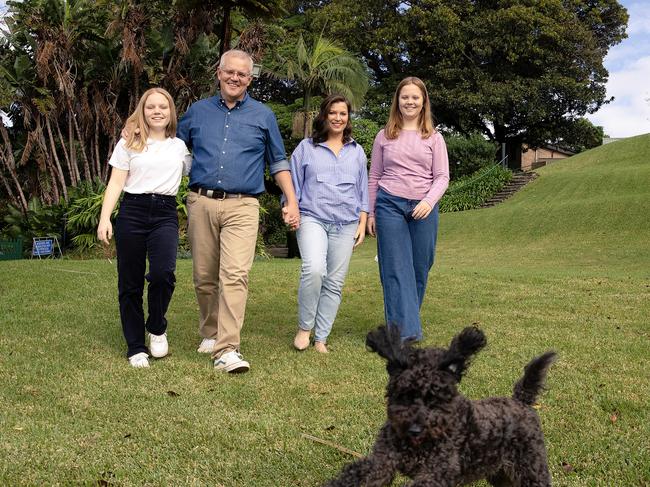
Asked what we can do to help young people, the Prime Minister gives a two-word answer followed by a long pause: “Stronger families.”
He says, while it’s important to have acute services and early intervention for kids who are struggling, it’s important to give parents the skills to be able to deal with things as far as possible within the family.
“I’m not a fan of contracting out when it comes to those things, you can’t contract family out,” he says.
“Families must be strong, families must be supported. Families must be nurtured. There are some who want to see the things that should be handled in families taken over by governments and all the rest of it. I’ll tell you what, you destroy the family, you’ll never come up with a replacement for the government. Ronald Reagan said that and he was dead right.”
Jenny agrees that families are important because they provide a framework to navigate life and “a safe place to come back to, knowing you’re supported by people who love you”.
“That builds confidence for children to go out into the world and know that someone believes in them, has the best intentions for them and wants them to succeed,” she says.
“I came from a very close family and wanted to provide that for my children.”
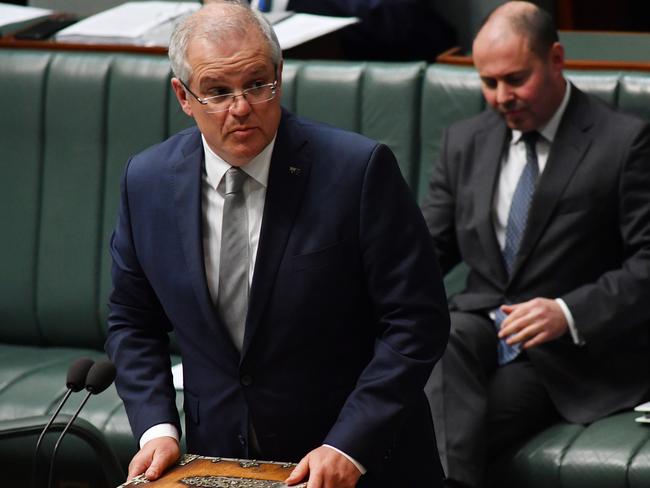
She says her priority as a parent is for their daughters to be happy and confident.
“Like most children, our girls have had to learn to be resilient with their father doing the job he is doing and family is a place that not only builds them up, but it provides a soft place to fall when things are tough.”
“Not everyone is lucky enough to have a family structure but hopefully they find in their life a mentor or support. Everyone wants someone to believe in them and have their back.”
ScoMo’s family life
For the Morrisons, keeping things normal has obviously been hard for the past few years. Their life together, Jenny says, revolves around family rituals.
“Routine is really important for our family. We make sure there are regular calls from Scott if he’s away and they FaceTime him every day, to share their days – what’s happened at school, with their friends, the dog, the cat,” she says.
“Rituals are also special – creating built-in family time which is fun, ensures time together and gives the girls something to look forward to.
“During lockdown the girls and I would spend time around the fire pit.
“On weekends, Fridays are pizza night – we make the dough, prepare the toppings and have dinner together, and then on Saturdays, if Scott is home, he cooks curry.
“The girls love watching the footy with him and he does too.”
Morrison says these small but important rituals, which include church on Sundays, provide certainty, which compensate for the pressures that politics places on family life.
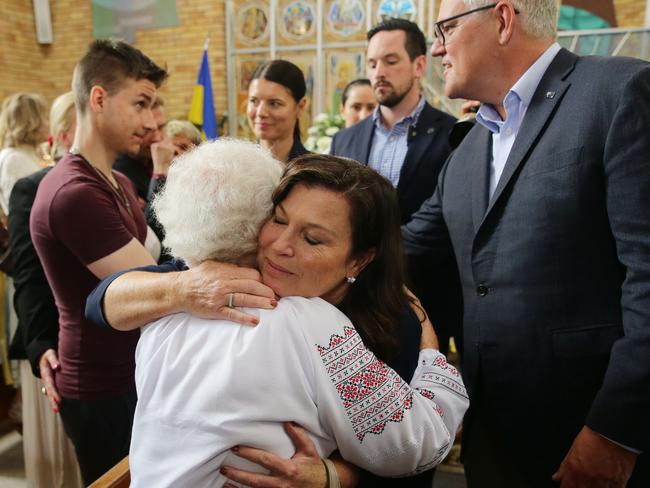
“It gives your family life a rhythm. Because there are so many things you can’t control.
“That’s why I keep coming back to family life. And the strength of families is the most important thing in the country.
“Families are strong, Australia’s strong. It sounds like something you’d read in the textbook, but it’s true.”
Many politicians say they regret the loss of normality that public life entails. But with Morrison, whose social world has never revolved around politics, you believe it.
“Our lives are obviously different,” he pauses, before continuing slowly. “Jenny and I really miss, very much miss, living back home. We understand it has to be different, (but) we’re very appreciative of what we do.”
His mood lightens as he recalls Australia Day. “Australia Day was fantastic. Australia Day, we just went home.
“The kids were running around, at a friend’s place in the pool, we were there with a bunch of parents that our kids grew up with. And we just sat there chatting away, laughing away, playing our playlists and drinking local beers. And the sun was out. And it was just a fantastic afternoon. It was very relaxing, and very energising.”
One of the hardest things about being Prime Minister is not being able to do that as much as he would like.
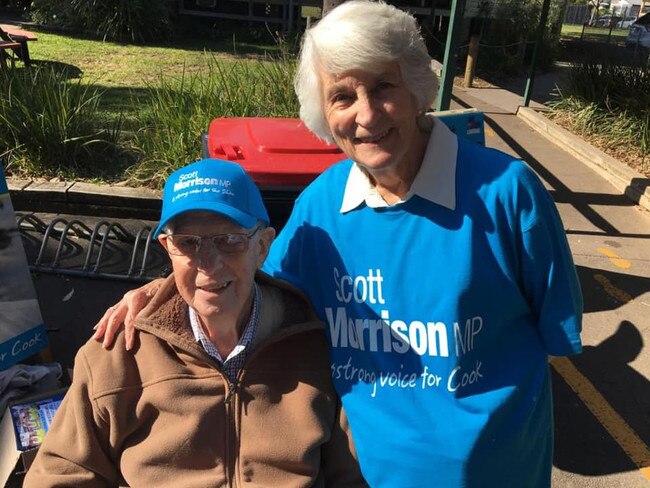
“Because that, for us, is our connection. That’s our whole foundation. And the job necessarily takes you away from that. When I was a treasurer, I was still living that way.
“In this job you’ve got to work really hard to maintain that connection.”
Neither he nor Jenny grew up in the Liberal Party or in politics, he says. Their friends, with one or two exceptions, have little to do with it.
“Our grounding comes from family, and we always try and stay connected to it as much as we possibly can. And what’s at the centre of all of those families that we hang out with? Their families. They’re not talking about politics. They just want their kids to be able to buy a house, to have good opportunities and grow up healthy.”
Life in the Morrison household
Like many parents, the Prime Minister has been forced by his children to learn the ways of the Marvel Cinematic Universe, his family’s favourite being Guardians of the Galaxy.
“They get annoyed because I can’t remember all the bits and pieces, how it connects and I get mixed up with a timeline about when this happened and when that happened. And so, I was book shopping one day on Amazon and there was a Marvel encyclopaedia on there, which I bought and it was about that thick,” he says gesturing with his hands, “and I gave it to Abbey and Lily and they loved it.”
The senior Morrisons on the other hand are classic Sunday night ABC people.
“We used to like Pie in the Sky, Hamish Macbeth, that sort of thing – Monarch of the Glen, those sorts of feel-good shows,” he says.
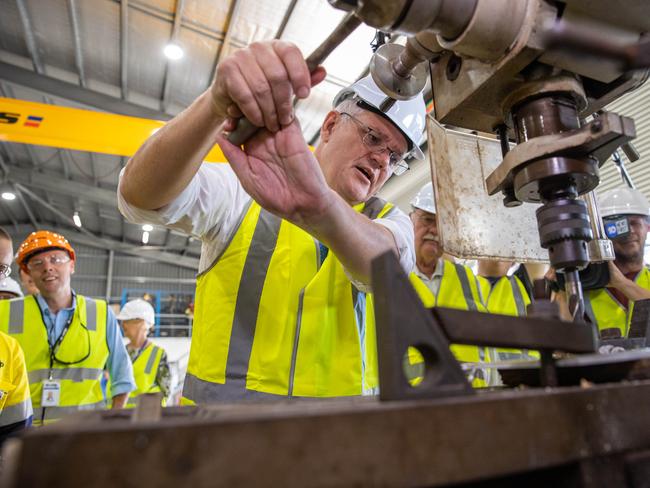
That’s not the only output of the national broadcaster for which he is prepared to express a sneaking fondness.
It’s clear from the ’80s Spotify playlist he released a few years ago, which is chock-full of UK acts like The Cure and The Smiths, that the teenage Morrison was into the “alternative” music of that era.
“I used to listen to Triple J a lot when I was younger: Angela Catterns, Richard Kingsmill, and of course Roy and HG,” he says.
It’s a little-known fact about Morrison that although he presents as an archetypical rugby league lover, he’s also a deep, lifelong fan of musicals.
“I grew up in a house that was obsessed with musical theatre. My parents were both in a musical theatre society for decades and decades,” he says.
“Dad always loved doing the character pieces. He was Big Jule (in Guys and Dolls) and Alfred Doolittle (in My Fair Lady).”
But it wasn’t just his parents Marion and the late John, young Scott appeared on stage too in Lionel Bart’s Oliver!
“I was the Artful Dodger, my father was Fagin. Dad played it many times.”
His parents also performed the operettas of Gilbert and Sullivan, the love of which has stayed with him.
“There was a brilliant version of Mikado, it was set in the 1940s and took the characters of that era and had them dressed in that way – it was very, very good. I’ve always been more attracted to not the Nanki-Poo type characters and the Frederick characters (romantic leads), but the sort of loveable rogues.”
“I really liked La La Land because it captured that 1940s era of musicals.”
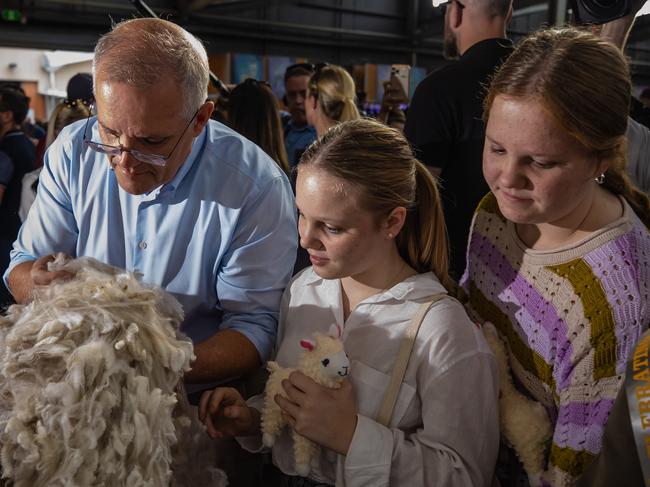
He’s even prepared to admit he liked Lin-Manuel’s rap musical Hamilton: “I watched it on Disney – I loved it.”
His favourite musical? “Probably Oliver! for sentimental reasons because I was in it with my dad.”
It wasn’t just a love of musicals that Scott Morrison learned from his father John, who died aged 84 in January 2020.
The future prime minister got his love of politics from his father, a policeman who also had a long career on the council of the Sydney municipality of Waverley.
“People get interested in politics. But it doesn’t necessarily translate into (a chance to run) for many, and that’s often a function of opportunity but the interest came when I was young, with watching my dad, as a local councillor, and an alderman, as it was known back then, and a mayor and I can see what he did. I just saw what he did.”
As a child, both his parents were deeply involved in community work.
“They got enormous satisfaction out of being able to make that contribution. And so that’s what drew me to it. And that’s what sustained me in it. So that’s why, you know, did I go off and join the Young Libs when I was 16? No. All the games of politics didn’t really interest me. But when the opportunity came later and, with people I met, sort of drew me into that world, I was a willing participant.”
But as a young man, politics was far from where he saw his future.
“It was my intention when I was going out of university to go to Bible college and become a pastor. That’s what I was going to do. Jenny and I had lined all that up: getting married and that’s what we’re going to do.”

Instead he found himself working at what today is the Property Council of Australia.
Morrison had studied applied economic geography as part of his Bachelor of Science at the University of New South Wales.
He picked it, he says “because I was really interested in how cities were settled. And how land and economics work together. I was always fascinated with maps when I was a kid and seeing how development started and how cities became big cities. And the history of all that I found quite fascinating.
“I was there as a research economist … and then found myself being drawn more on to the policy side of that, and then I engaged more in that and things took their course. Doors opened up, I met people in that world. And then things went from there to there.
“But the initial interest came from watching, particularly my dad who was in council, but also Mum in her doing community work through the church, that’s what we’re about. And they had a wonderful life together.”
Election campaign
Morrison spoke to me on the RAAF plane carrying him and his staff to Darwin.
A day earlier he had been campaigning in Sydney. A day later he would head across to Townsville before heading south to Rockhampton.
It’s the same frantic pace he set in 2019, work which brought forth that year’s miracle win.
Just having made it to this election is actually an achievement in itself. No one else has managed to serve a full term as Prime Minister since John Howard was beaten in 2007.
Morrison attributes that success to the way he has managed his team.
“It all starts with knowing that you don’t know everything, and you don’t have all the answers. And leadership is as much about harnessing all the knowledge and contributions in the team as it is actually setting out where we’re going.
“But I have ensured that the team has not been held together by the iron fist of discipline. It’s being held together by the genuine engagement and respect for each other.”
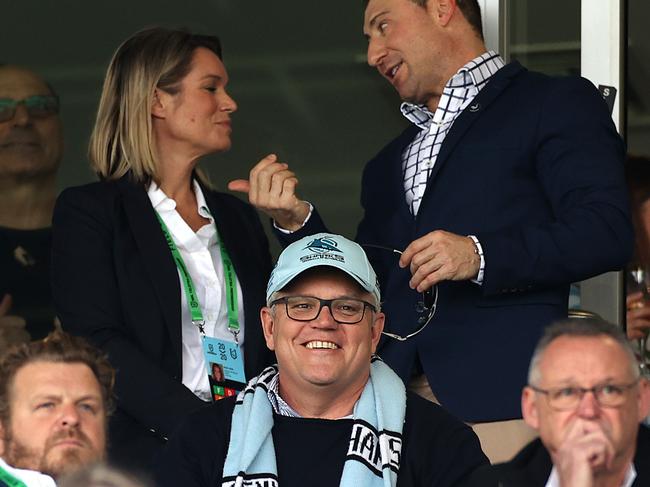
Even his detractors would acknowledge that he has been in office at a difficult time.
“In these last three and a half years – just one thing people say to me when they come up, whether they agree with me or they don’t, they all say the same thing: ‘You’ve had the hardest time to be doing this job of anyone in a very, very long time.’
“For those who perhaps don’t agree with me, there’s a grudging respect, if not affection, but on the other side, there are those that are very pleased with what we’ve done.”
Especially with JobKeeper, the wage subsidy scheme for businesses Morrison put in place at the height of the pandemic in 2020.
“The way we did JobKeeper I think is uniquely Liberal because if the Labor Party had done it, they would have seen it as a government program, but I never saw it that way. JobKeeper was a way of delivering income support at a scale that the country hadn’t seen since the Great Depression.
“What we were trying to achieve was the biggest confidence injection into the biggest uncertainty the country has seen since the Great Depression, and having to do it in a very short period of time.”
From the way he talks about it, one senses that Morrison realises JobKeeper may end up being his greatest legacy as he returns to it again and again.
Hanging over our conversation is the realisation that in less than a month it could all be over.
Yet, strangely, for a man who is fighting tooth and nail to keep a job, he seems remarkably relaxed about the prospect of it being suddenly taken away.
“It’s a function about how you go about the job,” he says.
“If you take every single day in this job as an opportunity to do what you hope to do and if you expend yourself fully in that, then I can’t see any reason why at the end of the day, you would leave bitter.

“Because if it’s about power, you’ll miss it. But if it’s not about power, you won’t. And for me, it’s not about that.
“I grew up in a family that was heavily service oriented. I’ve told this story a million times. Dad: police. Brother: paramedic. Mum: working in the church, and so on.
“The family ethos was, life is what you contribute, not what you accumulate.
“And so we weren’t a family that was about buying this car or this house. I mean, obviously, Jen and I did that to have a stable life for our family … but I wouldn’t really call us materialistic.
“It’s not how we grew up. And our faith has a lot to do with that too.
“But if you approach the job as being a servant, being of service, and if you feel that you’ve fully given it your all, well, then …”
Nor has he given much thought to what he might do after his life in office comes to an end.
“It’s just not how I’m wired,” Morrison says.
“And the best way to put it is this: John (Howard) explained it to me. He said, ‘if you focus on the job you’re doing now, and doing it really well, whatever happens after that, happens after that (but) if you’re always trying to think about the next thing, then you’re not spending all your effort thinking about the thing you’re responsible for right now’.
“And that’s how I tend to approach things. And my faith informs that.
“I’ve a sense of, this is what I’m doing. I love doing it, I feel really privileged to do it. And I give it 100 per cent.
“And at some point, that’s not what I’ll be doing. I’ll be doing something else.”
More Coverage
Originally published as Family and faith: Inside the world of Prime Minister Scott Morrison
Read related topics:Scott Morrison





